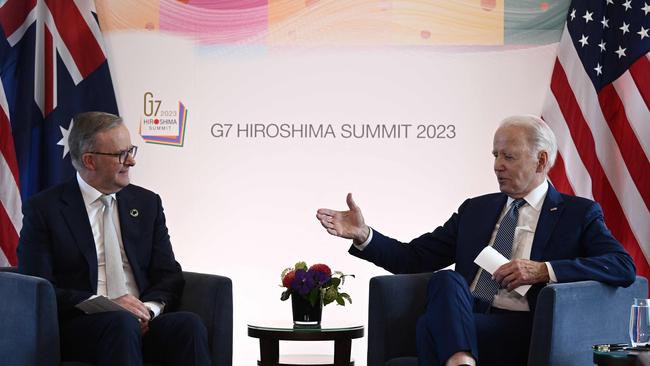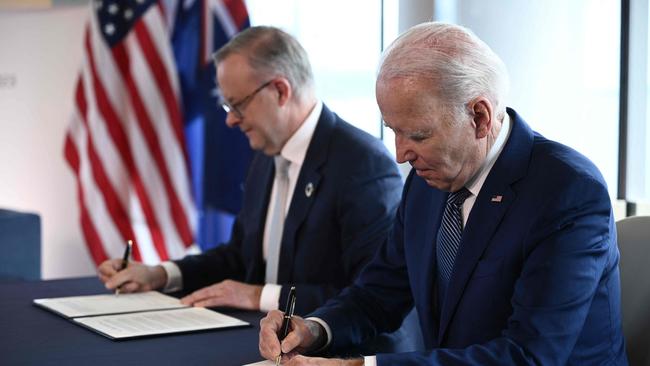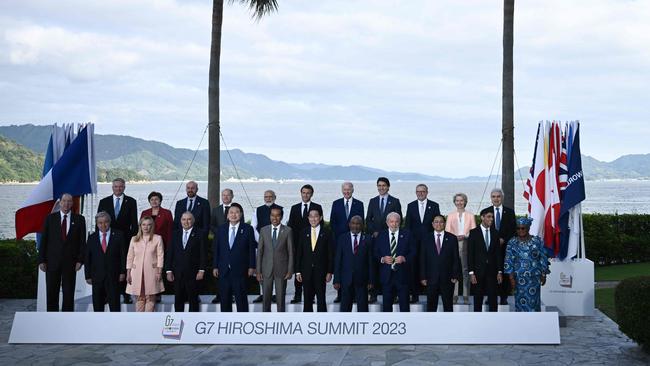Australia signs ‘transformation compact’ with United States on climate and clean energy
Australia has signed a new agreement with the United States on the sidelines of the G7 summit, hailed by president Joe Biden as the “third pillar” of the alliance.
World
Don't miss out on the headlines from World. Followed categories will be added to My News.
The United States and Australia have inked an historic climate deal, set to bolster the alliance as co-operation on clean energy becomes the “third pillar”.
Prime Minister Anthony Albanese said the landmark agreement signified the “largest action by any country” to tackle climate change and bolster clean energy investment.
The climate compact, signed on the sidelines of the G7 summit in Japan on Saturday, will tie the two countries’ resources to develop solar, wind and storage technology; co-ordinate critical minerals supply; develop new battery types; and supporting emerging hydrogen markets.
US President Joe Biden will also tell Congress he supports adding Australia as a domestic source in America’s defence industrial base, which will open up new opportunities for manufacturing and suppliers.
Mr Albanese said the major breakthrough would address the potential of capital leaving Australia to go to the US.

In a joint statement, the two leaders said the countries were committed to “delivering sustainable, resilient and secure critical minerals and clean energy technology to the world”.
“Australia is back around the table, and what we know is that action on climate change … is the entry-fee to credibility in the Indo-Pacific. Many of our neighbours understand that climate change is an existential threat,” Mr Albanese said in announcing the deal.
An action plan will be developed by the end of the year to deliver on it, with the countries committing to ministerial-level dialogue to steer joint efforts to reach net zero.
Addressing the media on Sunday morning, Mr Albanese said the “Climate Critical Minerals and Clean Energy Transformation Compact” was the “largest action by any country” to deal with climate change.
“Yesterday‘s bilateral meeting with President Biden was very important, and I want to thank the president for his support for the Climate Critical Minerals and Clean Energy Transformation Compact,” Mr Albanese told reporters in Hiroshima.
“This is incredibly important: we have been speaking about the largest action by any country to deal with the challenge of climate change and to direct investment into the clean energy transformation.
“What this will do is the president will support the congress taking action to treat Australian suppliers and activity as domestic activity in the US for the purpose of the Defence Production Act, Canada has that at the moment.
“And if we think about industries like hydrogen, without that support, there would be a massive incentive for hydrogen-based industries to be based in the US.”

President Biden lauded the agreement a “huge step forward” in the fight against the climate crisis.
“We’re going to establish climate and clean energy as the third pillar of the Australia-US Alliance,” he said.
“This contract can enable the expansion and diversification of clean energy supply chains, especially as it relates to critical materials.”
In a joint statement, the two leaders said the agreement would drive both countries’ economies to accelerate the global uptake of clean energy, and address the growing energy demands of the Indo-Pacific.

Opposition foreign affairs spokesman Simon Birmingham welcomed the climate agreement, saying it was “essential” to work collaboratively on climate.
Despite the Coalition voting against the government’s climate targets last year, Senator Birmingham said he didn’t want to see Australia water town its climate targets.
“The challenge of getting to net zero is going to be a difficult one for all the countries of the world,” he told ABC’s Insiders.
“It will take maximum co-operation between us and it does entail all of us making sure that we work through the different means of technological investment to get the types of outcomes that can ensure change – not just in our energy markets, but critically in terms of industrial emissions, transport emissions, agricultural emissions.
“There are a range of different sectors of all of our economies that need that type of investment and technological change to make net zero a reality.”

Shortly before G7 leaders gathered for a ceremonial welcome on Saturday, Mr Albanese met with Antonio Guterres, the United Nations’ Secretary General, on Saturday afternoon.
The two men discussed Australia’s commitment to the international order, humanitarian concerns in Sudan and Ukraine, and efforts to tackle climate change.
They spoke about the role of the UN, as well as the importance of supporting small island nations with finance, climate change resilience and adaptation.
During the summit’s first roundtable on Saturday evening, Mr Albanese addressed told leaders the meeting came at a “critical time” as the world was buffeted by a combination of shocks.
“People around the world are doing it tough … now is the time for us to come together,” he said.

He welcomed efforts to address global food security and spruiked Australia’s climate-focused “transformation” of agricultural systems.
“We must also focus on navigating back to resilient, inclusive and sustainable growth,” he said.
“A key element of this effort will be a global system evolved to deliver more development finance and address the most pressing challenges to global public goods.”
Originally published as Australia signs ‘transformation compact’ with United States on climate and clean energy


